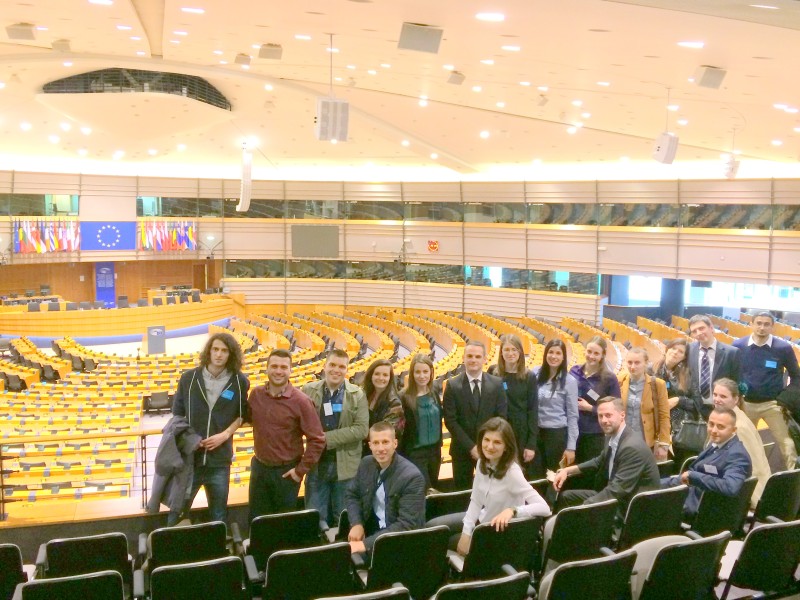Photo: Elizabeta Kitanovic
Press release: 17/15
18 April 2017
Brussels
Young Serbs and Croats in Brussels: "We had enough"
During Holy Week from 10-14 April 2017 young adults of the Serbian minority in Croatia and of the Croatian minority in Serbia visited the European institutions. The programme included several mediation sessions which were facilitated by the Quaker Council for European Affairs.
The youth from Serbia and Croatia sent a very strong message that they get along very well together, but many difficulties arise from political authorities in both countries. The young people saw the reasons as the inability of the political elite to create positive and strong economic ties in the South-Eastern European region and better possibilities for foreign investments in both countries.
The group visited the European Parliament and had discussions with Croatian MEP Ivan Jakovčić, ALDE and EP rapporteur for Serbian Accession to the EU MEP David McAllister. The study visit included also a session on the reconciliation process in Northern Ireland. Ms Linsey Moore, Deputy Head of Office in the Northern Ireland Executive Office in Brussels explained their work as well as the role of the EU in the reconciliation process, and the funding opportunities in this process which might take on a different shape after Brexit.
The question of European values such as human rights, democracy and the rule of law were discussed in the European Commission with Ms Catherine Wendt and Mr Kyriacos Charalambous from the Cabinet of Commissioner Johannes Hahn, European Neighbourhood Policy and Enlargement Negotiations. The message that the youth from Serbia and Croatia transmitted with a mutual voice was: “We have had enough” of the struggling relationships between Croatia and Serbia. They explained to the European Commission representatives that whenever there is struggle between two countries people like them suffer, and not the politicians. Also they expressed that the biggest problems in these two countries are youth unemployment and discrimination based on ethnicity as well as inciting religious and ethnical hatred, especially during election campaigns.
A similar message was given to the representatives of the Serbian Representation to the EU and the Croatian Permanent-Representation in Brussels with the emphasis that both minorities feel abandoned by their governments, and are used for political purposes in political arguments between the countries.
Auxiliary Bishop of Mechelen and Brussels of the Roman Catholic Church, Jean Kockerols, explained to the young delegates the life of the two communities in Belgium, Wallonia and Flanders and the efforts of churches for a peaceful coexistence in the country. The youth visited the Conference of European Churches, the Churches’ Commission for Migrants in Europe and COMECE (Commission of the Bishops’ Conference of the European Community).
One of the evenings during this study visit was devoted to communal cooking of Lenten foods and dark chocolate tasting. This programme was organized by the Thematic Reference Group on Human Rights of the Conference of European Churches.
Erin Green
Communication Coordinator
Conference of European Churches
Rue Joseph II, 174 B-1000 Brussels
Tel. +32 2 234 68 42
Fax +32 2 231 14 13
E-mail: eeg@cec-kek.be
Website: www.ceceurope.org
Facebook: www.facebook.com/ceceurope
Twitter: @ceceurope
The Conference of European Churches (CEC) is a fellowship of 115 Orthodox, Protestant, Anglican and Old Catholic Churches from all countries of Europe, plus 40 National Councils of Churches and Organisations in Partnership. CEC was founded in 1959. It has offices in Brussels and Strasbourg.
